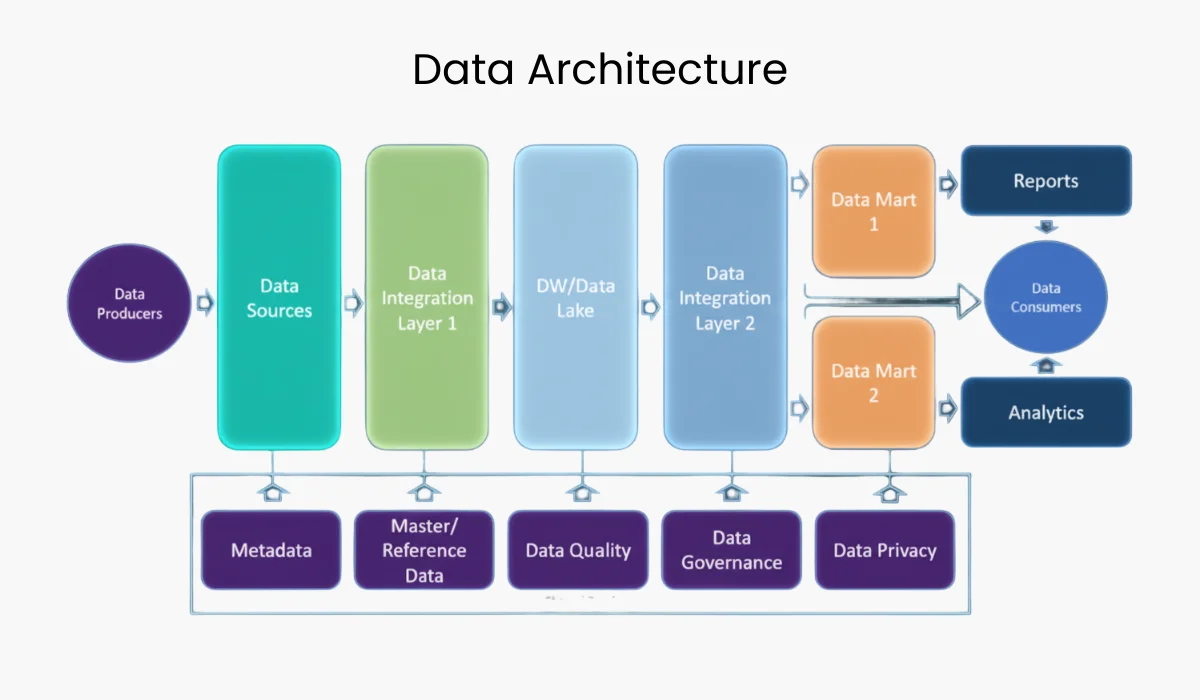Many organizations collect vast amounts of data every day, but having data doesn’t automatically translate into better decisions. Without the right approach, it’s easy for insights to get lost in spreadsheets, dashboards, or disconnected systems.
Big data consulting helps businesses make sense of that complexity. It’s not just about storing or processing data; it’s about identifying what matters, connecting the dots, and turning information into actions that improve performance. From uncovering inefficiencies to predicting trends, the right strategy can make the difference between guessing and making informed, confident decisions.
This guide walks through the practical aspects of big data consulting: building strategies that work, technology choices, risk and compliance considerations, and how consultants can help turn raw data into real business outcomes. Along the way, we’ll look at examples and emerging trends to show how these approaches are shaping the way companies use data today.
By the end, you’ll have a clear understanding of how big data consulting can help your business move faster, reduce risk, and make better-informed decisions.
What is Big Data Consulting?

At its core, big data consulting is about helping organizations make sense of large, complex datasets and use them to guide business decisions. It goes beyond basic reporting or dashboards, data consultants focus on turning raw data into actionable insights that align with business goals.
A consultant’s role can vary depending on the organization’s needs. Some projects focus on designing the right data architecture and integrating multiple data sources. Others concentrate on analytics strategy, helping teams identify which metrics truly matter and how to act on them. In many cases, consultants also support governance, compliance, and risk management, ensuring that insights are both accurate and secure.
Unlike in-house teams that might be limited by current tools, resources, or expertise, big data consultants bring a broader perspective. They’ve typically worked across industries and technologies, which allows them to spot patterns, inefficiencies, and opportunities that internal teams might overlook.
Ultimately, big data consulting isn’t just a technical exercise, it’s about aligning data initiatives with strategic objectives, so the insights you generate lead to measurable outcomes: higher efficiency, better customer understanding, or smarter investments.
Why Businesses Need Big Data Strategy Consulting

Collecting data is one thing; using it effectively is another. Many organizations struggle to extract meaningful insights because their data is disconnected, inconsistent, or difficult to interpret. Without guidance, decision-making can be slow, error-prone, or based on incomplete information. Big data consulting addresses these challenges in three key ways:
- Clarity and Focus
Consultants help identify which data matters most for your business goals. Instead of analyzing every available metric, they focus on the insights that directly impact performance, like customer behavior patterns, operational inefficiencies, or emerging market trends. - Speed and Efficiency
Large datasets can slow down internal teams. Consultants bring tools, frameworks, and expertise to process and analyze data faster, so decisions aren’t delayed while teams sort through information manually. - Actionable Insights
The value of data isn’t in charts or dashboards, it’s in how it informs action. Big data consulting ensures insights are clear, relevant, and tied to business outcomes, whether that means optimizing supply chains, improving customer engagement, or predicting risks before they occur.
By leveraging these benefits of big data consulting, businesses can move from reacting to trends to anticipating them, turning data into a strategic advantage rather than a technical burden.
How to Build a Big Data Strategy
A successful big data initiative starts with a clear strategy. Without one, even the most advanced tools or analytics platforms can produce results that are fragmented, irrelevant, or difficult to act upon. Here’s how a structured big data strategy typically comes together:
Define Business Objectives
The first step is identifying what your organization wants to achieve with data. Are you trying to improve operational efficiency, predict customer behavior, or identify new revenue streams? Clear goals ensure that every data initiative has a purpose.
Assess Data Sources and Quality
Consultants evaluate existing data, both internal and external, to determine what’s usable and where gaps exist. High-quality data is essential for accurate insights, so cleansing, normalization, and integration are often part of the early strategy phase.
Select the Right Tools and Architecture
A strategy also outlines the technical approach: data lakes vs. warehouses, streaming vs. batch processing, cloud vs. on-premises solutions. The choice depends on business needs, budget, and existing infrastructure.
Governance and Compliance
Data strategy isn’t just about what you analyze, it’s also about how you handle it responsibly. Governance policies, access controls, and compliance measures ensure that data is secure, auditable, and aligned with regulatory requirements.
Actionable Metrics and Roadmap
Finally, a big data strategy defines the key performance indicators (KPIs) to track progress and a roadmap for implementation. This ensures that data initiatives deliver measurable business outcomes, not just reports.
A well-defined strategy transforms data from a collection of numbers into a roadmap for informed decisions, giving organizations a clear path to achieving both short-term wins and long-term value.
Big Data Technology & Implementation

Once the strategy is clear, the next step is figuring out how to make it work technically. Big data consulting isn’t about using the latest tool for its own sake, it’s about choosing the right technology to achieve the business objectives identified in your strategy.
Key considerations include:
1. Data Architecture
Consultants design the framework for collecting, storing, and processing data. This might involve data lakes for raw, unstructured data, data warehouses for structured reporting, or a combination that fits your operations. The goal is flexibility, scalability, and accessibility for teams that need the insights.
2. Analytics Platforms and Tool:
The right tools depend on the types of analysis required. For example:
- Hadoop and Spark for large-scale batch and distributed processing
- Databricks for collaborative analytics and machine learning integration
- Real-time streaming platforms for applications like fraud detection or predictive maintenance
3. Integration with AI and Machine Learning
Beyond basic reporting, modern big data projects often incorporate AI models for predictive analytics, anomaly detection, or automated recommendations. Consultants guide which models make sense, how to train them on reliable data, and how to operationalize results so they inform decisions.
4. Cloud vs. On-Premises Decision
Many organizations move to cloud platforms for scalability and cost efficiency, while some keep sensitive data on-premises for compliance. Consultants evaluate hybrid models, helping companies balance performance, security, and cost.
5. Performance and Optimization
A critical role of big data consulting is ensuring the system runs efficiently at scale. This includes data pipeline optimization, query performance tuning, and monitoring frameworks to keep insights timely and accurate.
When implemented effectively, the technology layer turns strategy into actionable results, enabling teams to access insights quickly, experiment safely, and make data-driven decisions with confidence.
Governance, Risk & Compliance
Even the best big data strategy and technology setup can fall short without proper governance and risk management. Big data consulting ensures that your data initiatives are not only effective but also secure, compliant, and reliable.
Key focus areas include:
- Data Governance: Governance defines who can access data, how it’s used, and how quality is maintained. Consultants help create policies and processes that standardize data management across departments, reducing errors and improving consistency.
- Security and Privacy: Protecting sensitive information is non-negotiable. Big data consultants assess potential vulnerabilities, implement access controls and encryption, and guide compliance with privacy regulations like GDPR, HIPAA, or industry-specific standards.
- Risk Management: Poorly managed data can lead to operational risks, regulatory penalties, and flawed decisions. Consultants identify risks early, such as incomplete datasets, misconfigured pipelines, or biased models, and recommend controls to mitigate them before they impact the business.
- Compliance Audits and Reporting: For organizations under strict regulatory scrutiny, consultants help implement audit trails and reporting mechanisms. This ensures that data handling is transparent, traceable, and aligned with internal and external requirements.
By embedding governance and risk management into your big data initiatives, you ensure that insights are trustworthy, repeatable, and legally compliant, turning data from a potential liability into a reliable asset.
Choosing the Right Big Data Consulting Services Provider

Selecting a big data consulting services provider is more than picking a vendor, it’s finding a team that understands your business goals, challenges, and technical environment. The right partner can accelerate your initiatives, while the wrong one can waste time and resources.
Consider these key factors when evaluating consultants:
- Relevant Experience: Look for partners who have worked with organizations similar in size, industry, or complexity. Experience with comparable use cases ensures they understand your challenges and can deliver results faster.
- Technical Expertise
The right consultant should be familiar with the tools, platforms, and architectures your strategy requires, whether that’s Hadoop, Spark, cloud-based pipelines, or AI/ML integration. - Strategic Approach: Avoid consultants who focus solely on technology deployment. The best partners combine technical skills with business acumen, helping align data initiatives to measurable business outcomes.
- Engagement Model: Consider how the consultant will work with your team: project-based, retainer, or hybrid. Ensure the model allows for knowledge transfer and collaboration, not just short-term delivery.
- Proven Results: Ask for case studies or references. Real-world outcomes like improved operational efficiency, revenue growth, or risk reduction, offer tangible proof of what a big data consulting services provider can deliver.
- Cultural Fit and Communication: Successful consulting is about collaboration and trust. Evaluate how well the team communicates, responds to questions, and adapts to your organization’s culture.
Choosing the right consulting partner ensures that your big data strategy doesn’t just stay on paper but produces actionable results. It’s an investment in both your technology and your business outcomes.
Conclusion
Big data strategy isn’t just about technology or analytics, it’s about turning information into decisions that drive real business outcomes. From building a clear strategy and implementing the right architecture to ensuring governance, risk management, and industry-specific insights, consulting helps organizations move faster, reduce uncertainty, and stay ahead of the competition.
If your organization is struggling to make sense of its data, or you want to unlock hidden opportunities, partnering with the right big data consulting services provider can make all the difference.






